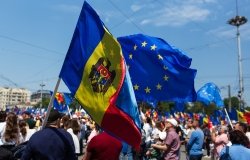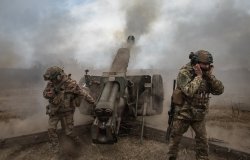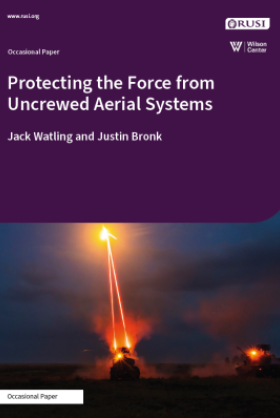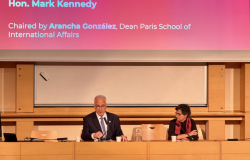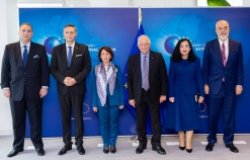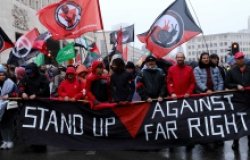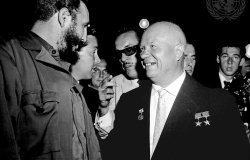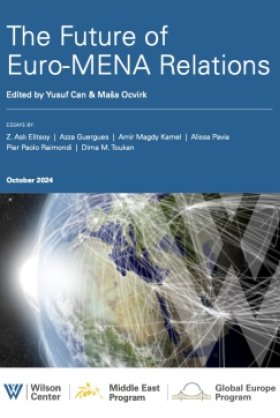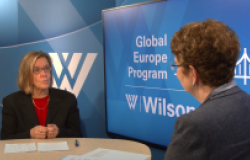September 11 and the Persistence of Regional Conflicts
Nov./Dec. 2001 - Historically, when a major international conflict breaks out in the world, the terms of every other conflict--including lesser, more localized disputes that are important to the people involved, but obscure to most outsiders--instantly change. America's battle against terrorism certainly ranks as a major international conflict, and every other war zone looks different as a result.
Since September 11, U.S. diplomats have been giving every party to every local war or flashpoint in the world the same message: at a minimum, do not cause trouble, or distract U.S. or international attention, by engaging in provocative behavior or destabilizing your corner of the earth any further. Preferably, make peace and engage in something positive to help us with our campaign against terror.
How does this apply to southeastern Europe, whose many-sided local feuds have survived two world wars, and whose politicians and warlords have a centuries-old talent for manipulating outside powers that seek to steer them in one direction or another?
There are some in the Balkans who believe that the post-September 11 international order will work to their advantage. For example, the authorities and pro-government media in Serbia and Macedonia have been quick to denounce their old regional adversaries, both Bosnian and ethnic Albanian, as closet extremists who have given succor to Osama bin Laden and his network of Islamic terror.
These insinuations are exaggerated, but they are not completely without foundation. An Islamist cell seems to have been at work in Bosnia recently, causing a major security headache to Western embassies in Sarajevo. The Pentagon admitted that, in 1999, it had to keep senior U.S. officials, including the secretary of defense, away from Albania because they might be attacked by terrorists.
But the fact that violent Islamists have sometimes found a niche among their co-religionists in the Balkans does not mean that the region's Slavs will instantly be converted into America's best friends.
In reality, the United States has never been under any illusion about the presence of militant Islam in southeastern Europe. That has simply made it even more anxious to co-opt the grievances of Balkan Muslims and become the ultimate guarantor of their security in order to deny that role to rogue states, and rogue groups, who might otherwise step into the breach.
This policy has had some success. Two years after NATO's air war against Yugoslavia, pro-American sentiment remains strong among Kosovar Albanians. This feeling is not mutual. Among the Western powers, including the U.S., attitudes toward the Kosovars are much less warm today than they were two years ago. But that has less to do with fears of militant Islam and more to do with exasperation over ethnic Albanian armed groups, their links to crime and militant nationalism, and their reluctance to lay down their arms.
A bit more realistically than the Serbs or the Macedonians, the political and military leaders of Turkey apparently believe that, since September 11, they have become more critical than ever to U.S. security interests.
In this new climate, Turkey seems likely to take an even tougher stance on regional security issues where it sees its interests at stake. Already, it has made clear that it will be less likely to agree to European-only defense arrangements under the political authority of the European Union, which seem to downgrade Turkey's role.
More important, Turkey will take a tougher line on the issues posed by the prospective admission of Cyprus to the EU. This increases the chances of a fresh, serious crisis over the Cyprus issue, which are already greater than most people think.
Whatever the pros and cons of taking a divided Cyprus into the EU may be--in other words, accepting into the EU's ranks the island's internationally recognized government in the absence of a settlement--such a move has strategic consequences which the EU, as an institution, is poorly placed to deal with.
Because of the EU's history as an economic giant and geopolitical midget, with no experience in strategic or military affairs, it has a habit of treating all problems as though they were purely technical issues with technical solutions.
EU bureaucrats tend to assume that, because the Turkish Cypriots' economic interests would be well served by joining the bloc, as part of a loosely reunited island, their leaders will eventually agree to this arrangement. Under this logic, giving the Greek Cypriot-controlled part of Cyprus the benefits of EU membership first will act as an incentive to the Turkish Cypriots to do the sensible thing.
In fact, almost the opposite may occur. The admission of the Turkish Cypriots to the zone of Euro-prosperity, however desirable in itself, could also be threatening to the self-defined interests of Turkey's security establishment, which are quite well served by the existing situation.
So Turkey's warnings that it may annex northern Cyprus if Nicosia is admitted to the EU have to be taken seriously, all the more so because they have been issued by a country that feels even more essential to American security interests--and therefore immune to American pressure--than before.
What about Macedonia, a hot spot whose memories of intercommunal war are much more recent? There, the post-September 11 message of U.S. diplomacy has appeared to bring mostly impressive results. The ethnic Albanian guerrillas of the National Liberation Army (NLA) came under massive, and apparently effective, pressure to call a halt to their military campaign, at least for the foreseeable future.
Unfortunately, it would be premature to say that the U.S. has brought lasting stability to the Balkans by a single masterly wave of its geopolitical wand.
Macedonia, for a start, remains fragile. The month-long NATO operation to relieve the ethnic Albanian fighters of their weapons only garnered about 15 percent of the total number of guns available to the guerrilla force, according to Western diplomats in the region.
The so-called Albanian National Army, apparently an extreme offshoot of the mainstream rebel movement, claimed responsibility for the killing of three policemen in Macedonia during a November 11 flare-up of violence.
In Serbia's Presevo Valley, where NATO skillfully put an end to an ethnic Albanian insurgency earlier this year, a new force has sprung up, apparently consisting of NLA veterans calling themselves the Army for the Liberation of Eastern Kosovo.
While the November 17 elections in Kosovo were intended to defuse tension in the province, the short-term effect may be the opposite. As the price for their participation in the elections, the province's Serbs were assured that independence for Kosovo is off the agenda for now. That will be galling for the armed ethnic Albanian groups, who have a history of operating on the periphery of the province, rather than inside it.
There are, therefore, no grounds for complacency about peace and stability in the Balkans and the eastern Mediterranean. Many of the security pundits who used to practice their skills in southeastern Europe have turned their attention toward Afghanistan. They should not throw out their Balkan maps or Ottoman history books. The Balkans remain a powder keg, Cyprus is volatile, and both need long-term solutions.
About the Author
Bruce Clark
Read More
Global Europe Program
The Global Europe Program is focused on Europe’s capabilities, and how it engages on critical global issues. We investigate European approaches to critical global issues. We examine Europe’s relations with Russia and Eurasia, China and the Indo-Pacific, the Middle East and Africa. Our initiatives include “Ukraine in Europe” – an examination of what it will take to make Ukraine’s European future a reality. But we also examine the role of NATO, the European Union and the OSCE, Europe’s energy security, transatlantic trade disputes, and challenges to democracy. The Global Europe Program’s staff, scholars-in-residence, and Global Fellows participate in seminars, policy study groups, and international conferences to provide analytical recommendations to policy makers and the media. Read more
